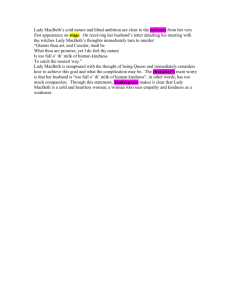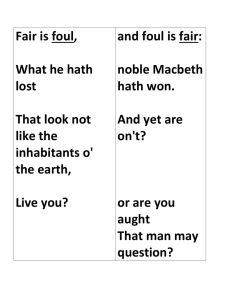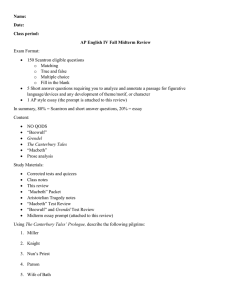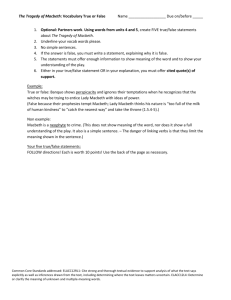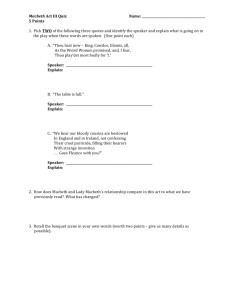Grade 11 English Literature Exam Paper - Macbeth & Poetry
advertisement
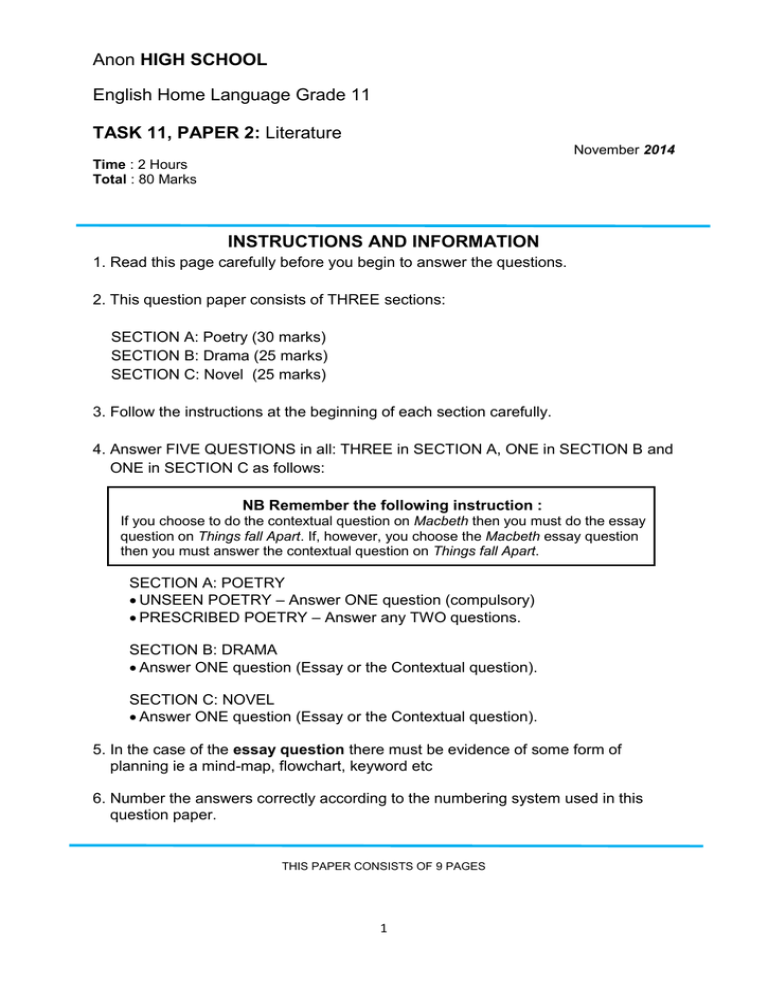
Anon HIGH SCHOOL English Home Language Grade 11 TASK 11, PAPER 2: Literature November 2014 Time : 2 Hours Total : 80 Marks INSTRUCTIONS AND INFORMATION 1. Read this page carefully before you begin to answer the questions. 2. This question paper consists of THREE sections: SECTION A: Poetry (30 marks) SECTION B: Drama (25 marks) SECTION C: Novel (25 marks) 3. Follow the instructions at the beginning of each section carefully. 4. Answer FIVE QUESTIONS in all: THREE in SECTION A, ONE in SECTION B and ONE in SECTION C as follows: NB Remember the following instruction : If you choose to do the contextual question on Macbeth then you must do the essay question on Things fall Apart. If, however, you choose the Macbeth essay question then you must answer the contextual question on Things fall Apart. SECTION A: POETRY UNSEEN POETRY – Answer ONE question (compulsory) PRESCRIBED POETRY – Answer any TWO questions. SECTION B: DRAMA Answer ONE question (Essay or the Contextual question). SECTION C: NOVEL Answer ONE question (Essay or the Contextual question). 5. In the case of the essay question there must be evidence of some form of planning ie a mind-map, flowchart, keyword etc 6. Number the answers correctly according to the numbering system used in this question paper. THIS PAPER CONSISTS OF 9 PAGES 1 SECTION A: Poetry Question 1: Unseen poem( compulsory ) How Do I Love Thee ? (Sonnet 43) - by Elizabeth Barrett Browning How do I love thee? Let me count the ways. I love thee to the depth and breadth and height My soul can reach, when feeling out of sight For the ends of Being and ideal Grace. I love thee to the level of everyday's Most quiet need, by sun and candle-light. I love thee freely, as men strive for Right; I love thee purely, as they turn from Praise. I love thee with the passion put to use In my old griefs, and with my childhood's faith. I love thee with a love I seemed to lose With my lost saints – I love thee with the breath, Smiles, tears, of all my life! – and, if God choose, I shall but love thee better after death. 1.1 What is the rhyming scheme of this poem? (2) 1.2 How would the poem be different if the opening line was “Why do I love thee?” (2) 1.3 How many ways of loving does the speaker identify? Do these ways of loving overlap, conflict or complement one another? 1+3=(4) 1.4 Explain the effects of the last two lines of the poem. (2) (10) Do any two of the following four poems. Question 2: On his blindness (Sonnet 16) - John Milton When I consider how my light is spent, Ere half my days, in this dark world and wide, And that one Talent which is death to hide Lodged with me useless, though my Soul more bent To serve therewith my Maker, and present My true account, lest he returning chide; “Doth God exact day-labour, light denied?" I fondly ask. But patience, to prevent That murmur, soon replies, "God doth not need Either man's work or his own gifts; who best Bear his mild yoke, they serve him best. His state Is Kingly. Thousands at his bidding speed And post o'er Land and Ocean without rest: They also serve who only stand and wait." 2 2.1 What kind of sonnet is this poem? 2.2 What is the theme of the Octave? What is the theme of the Sestet? 2.3 In line 1, ‘light’ is a metaphor for A. A dark world B. An enlightened world C. The poet’s eyesight D. The poet’s blindness 2.4 In line 2, ‘’Ere half my days” refers to A. His lack of commitment B. Half of his expected life span C. His entire life D. His life expectancy 2.5 Quote an example of alliteration from the Octave. 2.6 Quote a line from the poem that says God is not dependent on man. 2.7 It is said that the poet over-exaggerate his blindness. Is this true? Substantiate your answer with clear reference to the poem. (1) (2) (1) (1) (1) (2) (2) (10) Question 3: To me, fair friend, you never can be old (Sonnet 104) – Shakespeare To me, fair friend, you never can be old, For as you were when first your eye I eyed, Such seems your beauty still. Three winters cold, Have from the forests shook three summers' pride, Three beauteous springs to yellow autumn turned, In process of the seasons have I seen, Three April perfumes in three hot Junes burned, Since first I saw you fresh, which yet are green. Ah! yet doth beauty like a dial-hand, Steal from his figure, and no pace perceived; So your sweet hue, which methinks still doth stand, Hath motion, and mine eye may be deceived: For fear of which, hear this, thou age unbred: Ere you were born was beauty's summer dead 3.1 Shakespeare made ample use of old English, this is known as A. Jargon B. Archaisms C. Vocabulary D. Terminology 3.2 Write the following line in standard English: “when first your eye I eyed” 3.3 In line 9 and 10 the poet compares beauty with what? 3.4 Why does the poet think his eye is deceived (line 12)? 3.5 What compliment does the poet give his friend in the last two lines? 3.6 The word ‘beauty’ is repeated four times in this poem. According to the poet, what is beauty’s greatest enemy? 3 (1) (2) (2) (2) (2) (1) (10) Question 4: Not Waving but Drowning - STEVIE SMITH Nobody heard him, the dead man, But still he lay moaning: I was much further out than you thought And not waving but drowning. Poor chap, he always loved larking And now he’s dead It must have been too cold for him his heart gave way, They said. Oh, no no no, it was too cold always (Still the dead one lay moaning) I was much too far out all my life And not waving but drowning. 4.1 This is a poem of several voices or speakers. Identify the voices. 4.2 What is the purpose of using this technique? 4.3 How does the poet use punctuation to create effect and shape the meaning in her work? 4.4 Account for the triple use of ‘no’ in line 9 (stanza 3). 4.5 What is the literal and figurative meaning of this poem? (2) (2) (2) (2) (2) (10) Question 5: Let the children decide – Don Mattera Let us halt this quibbling Of reform and racial preservation Saying who belongs to which nation And let the children decide It is their world. 5 Let us burn our uniforms Of old scars and grievances And call back our spent dreams And the relics of crass tradition That hang on our malignant hearts 10 And let the children decide For it IS their world 5.1 What is the tone of the poem? Choose the best answer. A. Empathetic B. Sad C. Hopeful D. Happy 4 (1) 5.2 Refer to lines 6-7. Name the figure of speech used here? A. Simile B. Metaphor C. Sarcasm D. Euphemism 5.3 What two things are compared here (lines 6 and 7)? 5.4 What are ‘spent dreams’? 5.5 Refer to line 10. 5.5.1 What adjective is used to describe our “hearts’’? 5.5.2 What are the connotations of this word (above answer)? 5.6 What is the effect of the use of capitals for the word ‘’IS’’ in the last line? 5.7 What do you think it is that the poet says we must let the children decide? Refer to the poem and justify your answer. (1) (1) (2) (1) (1) (1) (2) (10) TOTAL SECTION A : 30 SECTION B QUESTION 6 : ( The ESSAY question ) If you choose to answer this question (essay) then you must do Question 9 ie the contextual question in Section C. Answer any ONE of the following essay questions. Length : 350 – 400 words. ( Indicate your choice of topic clearly ) 6.1 From reading Act 1, explain what Shakespeare imagined to be the qualities of a good king. How do Duncan and Macbeth fit this role? Consider Macbeth’s and Duncan’s qualities from the beginning of Act 1 and at the end of Act 1. OR 6.2 Discuss the marriage of Macbeth and Lady Macbeth. In your essay, mention the various roles of each person in the marriage that is shown throughout Act 1. OR 6.3 In the play Macbeth, the witches of the text is known as the ‘’weird sisters”. They are taught to be the controllers of people’s fate and destiny. They are generally regarded as evil and greatly feared. What role do the witches play in the evil doings in the play? (25) OR QUESTION 7 : Macbeth ( Contextual question ) If you choose to answer this question then you must do Question 8 ie the essay question in Section C. ( Extract follows on next page) 5 Answer the questions set on both extracts EXTRACT A :Act 1, Scene 5 LADY MACBETH: ‘They met me in the day of success: and I have learned by the perfectest report, they have more in them than mortal knowledge. When I burned in desire to question them further, they made themselves air, into which they vanished. Whiles I stood rapt in the wonder of it, came missives from the king, who all-hailed me “Thane of Cawdor;” by which title, before, these weird sisters saluted me, and referred me to the coming on of time, with “Hail, king that shalt be!” This have I thought good to deliver thee, my dearest partner of greatness, that thou mightst not lose the dues of rejoicing, by being ignorant of what greatness is promised thee. Lay it to thy heart, and farewell.’ Glamis thou art, and Cawdor; and shalt be What thou art promised: yet do I fear thy nature; It is too full o’ the milk of human kindness To catch the nearest way: thou wouldst be great; Art not without ambition, but without The illness should attend it: what thou wouldst highly, That wouldst thou holily; wouldst not play false, And yet wouldst wrongly win: thou’ldst have, great Glamis, That which cries ‘Thus thou must do, if thou have it; And that which rather thou dost fear to do Than wishest should be undone.’ Hie thee hither, That I may pour my spirits in thine ear; And chastise with the valor of my tongue All that impedes thee from the golden round, Which fate and metaphysical aid doth seem To have thee crown’d withal. Answer the following questions using your own words unless asked to quote. 7.1 Who wrote the letter (first paragraph) that Lady Macbeth is reading? 7.2 In two lines, what is the above mentioned person telling Lady Macbeth in the letter? 7.3 What is meant by ‘’Hail, king, that shalt be’’? 7.4 What words and images does Lady Macbeth use to describe her husband? 7.5 Why is Lady Macbeth eager to get her husband home? 7.6 Later in this scene, what advice does Lady Macbeth give her husband when he arrives home? AND 6 (1) (2) (2) (3) (2) (2) (12) EXTRACT B : Act 1, scene 7 MACBETH: We will proceed no further in this business: He hath honor’d me of late; and I have bought Golden opinions from all sorts of people, Which would be worn now in their newest gloss, Not cast aside so soon. 5 LADY MACBETH: Was the hope drunk Wherein you dress’d yourself? hath it slept since? And wakes it now, to look so green and pale At what it did so freely? From this time Such I account thy love. Art thou afeard To be the same in thine own act and valor As thou art in desire? Wouldst thou have that Which thou esteem’st the ornament of life, And live a coward in thine own esteem, Letting ‘I dare not’ wait upon ‘I would,’ Like the poor cat i’ the adage? ... ... ... ... ... MACBETH: If we should fail? LADY MACBETH: We fail! But screw your courage to the sticking-place, And we’ll not fail. When Duncan is asleep— Whereto the rather shall his day’s hard journey Soundly invite him—his two chamberlains Will I with wine and wassail so convince That memory, the warder of the brain, Shall be a fume, and the receipt of reason A limbeck only: when in swinish sleep Their drenched natures lie as in a death, What cannot you and I perform upon The unguarded Duncan?what not put upon His spongy officers, who shall bear the guilt Of our great quell? 10 15 20 25 7.7 Earlier in this scene Lady Macbeth “prays” to the spirits to “’unsex me here’’. What did she mean by this and explain why she did it. 7.8 Refer to the first three lines: “We will proceed no further in this business:” 7.8.1. What “business” is Macbeth referring to? 7.8.2. What reason does he give Lady Macbeth for not wanting to proceed “further in this business” ? Use your own words. 7.9 What does Macbeth realize about the consequence of Duncan’s murder? Choose the best option below. A. Other than satisfying his own ambition, it will make everything worse. B. It will be simple and tidy route to achieving his ambitions. C. Though he will become king, he’ll lose his hold to Cawdor. D. If the witches are right, he will be king and an immortal. 7.10 What arguments (lines 6 – 15) does Lady Macbeth use to convince Macbeth to commit murder? 7.11 In your own words, what is Lady Macbeth’s plan? 7 (2) (1) (1) (1) (2) (3) 7.12 What does this scene reveal or imply about Lady Macbeth’s personality? 7.13 Is Lady Macbeth successful in convincing Macbeth to go ahead with the murder ? Say Yes or No. (2) (1) (13) TOTAL SECTION B: 25 SECTION C ( The novel, Things fall apart ) QUESTION 8 : The Essay question (Do this question if you did question 7 in Sect B.) Answer any ONE of the following essay questions. Length : 350 – 400 words. ( Indicate your choice of topic clearly ) 8.1. In a well-drafted essay discuss the role Ibo culture plays in the lives of the main characters in the novel. Focus on the interaction between the characters and : cultural events – Week of Peace; Feast of the New Yam (wrestling) superstitions around the abomination and snakes for example; role of the oracle – its power; medicine etc OR 8.2. Discuss Okonkwo’s rise to a position of leadership among the Ibo (Igbo) tribe, despite the fact that he inherited nothing from his father. Focus on : his skill in wrestling as well as in battle; how Nwakibie gave his first chance; his great wealth (titles, wives etc); his determination not to end up like his father; most importantly, his character. (25) QUESTION 9 : The Contextual question (only do this question if you answered quest. 6 in Sect B) Extract C : from Chapter 5 The New Yam Festival was thus an occasion for joy throughout Umuofia. And every man whose arm was strong, as the Ibo people say, was expected to invite large numbers of guests from far and wide. Okonkwo always asked his wives' relations, and since he now had three wives his guests would make a fairly big crowd. 5 But somehow Okonkwo could never become as enthusiastic over feasts as most people. He was a good eater and he could drink one or two fairly big gourds of palm - wine. But he was always uncomfortable sitting around for days waiting for a feast or getting over it. He would be very much happier working on his farm. 10 The festival was now only three days away. Okonkwo's wives had scrubbed the walls and the huts with with red earth until they reflected light. They had then drawn patterns on them in white, yellow and dark green.... The three women talked excitedly about relations who had been invited, and the children revelled in the thought of being spoilt by these visitors from motherland. cont /... 8 Ikemefuna was equally excited. The New Yam Festival seemed to him to be a much bigger event here than in his own village, a place which was already becoming remoter and vague in his imagination. And then the storm burst. Okonkwo, who had been walking about aimlessly in his compound in suppressed anger, suddenly found an outlet. " Who killed this banana tree ?" he asked. A hush fell on the compound immediately. 9.1. The Ibo ( or Igbo) admires a man " whose arm was strong " ( line 2 ) . 9.1.1. How do we know that Okonkwo was a man whose arm was indeed strong ? (2) 9.1.2. In an earlier chapter we met a man whose arm wasn't at all strong. Who was this man AND how did Okonkwo feel about him ? (2) 9.1.3. The man you mentioned above in 7.1.2. had an especially shameful death. What was so shameful about the way he died ? (2) 9.2. Why did the Ibo people celebrate the New Yam Festival ? (1) 9.3.1. How did Okonkwo feel about the New Yam Festival ? 9.3.2. What does this tell us about the kind of man he was ? 9.3.3. Okonkwo was especially impatient with unsuccessful men. Give an example where he revealed this characteristic. 9.3.4. How did the other leaders of the tribe respond to Okonkwo's outburst of impatience ? (1) (1) (1) (2) 9.4. Earlier Ikemefuna was referred to as " ill - fated " and " doomed " . 9.4.1. How did it happen that Ikemefuna came to live with Okonkwo ? (3) 9.4.2. Okonkwo rarely showed any affection but how did he eventually came to feel about Ikemefuna ? (2) 9.4.3. " Ill - fated " and " doomed " are both examples of foreshadowing. What does foreshadowing mean ? (1) 9.5. Refer to the last line : " A hush (silence) fell on the compound immediately. " 9.5.1. A banana tree is not that important among the Ibo tribe so why did Okonkwo's family suddenly became so quiet ? (1) 9.5.2. How did Okonkwo rule his household ? (1) 9.5.3. This is not the first time Okonkwo lost his temper. Describe what happened the first time. (2) 9.5.4. This first incident happened during the Week of ................ . (complete the sentence above). (1) 9.5.5. How was Okonkwo punished when he broke the rules of the holy week, mentioned in 7.5.4. (3) (25) TOTAL SECTION C : 25 GRAND TOTAL : 80 9
